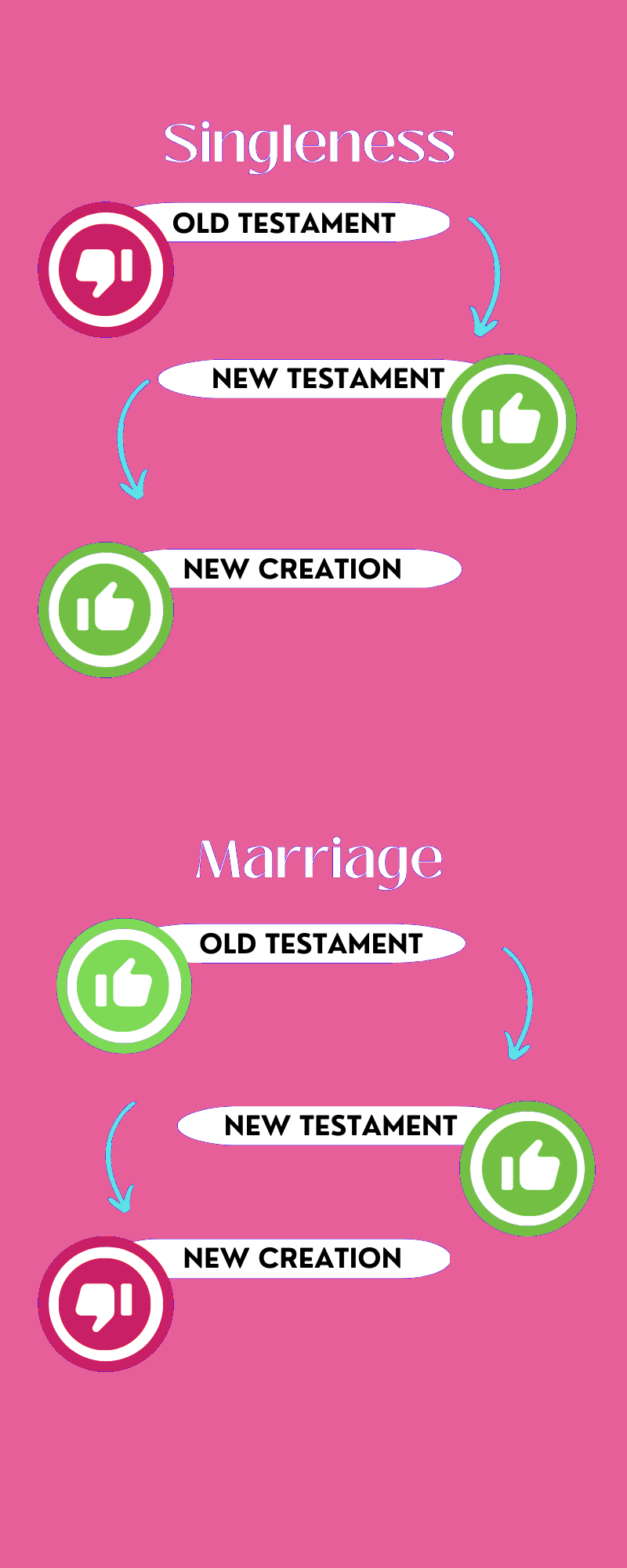Is the Bible positive about singleness?
When looking at this question, “is the Bible positive about singleness?”, it’s easy for us to jump straight to the Apostle Paul’s verdict, “I wish that all men were [unmarried] as I am”– 1 Cor 7:7. But how do we reconcile this with the consistent emphasis on marriage and filling the land throughout the Old Testament? This seems to be one of God’s priorities from the start, beginning with God’s command to Adam and Eve to “be fruitful and multiply” – Gen 1:28.
Old Testament view on singleness
The Old Testament is almost silent on singleness. Instead, it focuses on the goodness of marriage and children. For example, God’s verdict on Adam was that he needed a fellow worker to help him look after the garden: “it is not good for man to be alone”– Gen 2:18. The first book of the Bible is preoccupied with “offspring” (eg Genesis 3:15) and is has genealogies (long lists of “X was the son of Y...”) dotted throughout. Before Jesus, singleness was exceptional – for example, the prophet Jeremiah was commanded not to marry, perhaps using the unusualness of this situation to make a particular prophetic point (Jeremiah 16:1-4).
‘Offspring’ promised
Central to the narrative of the Old Testament are God’s promises to Abram, which focused on entering the land and being blessed with many descendants:
“Look toward heaven, and number the stars... So shall your offspring be.” – Genesis 15:5. In Deuteronomy 28:1-14, Moses expanded upon God’s promises to Abraham. Moses explained to the Israelite people that, if they obeyed God’s laws, then He would bless them with land, livestock and children. The Old Testament norm was that people would marry and have children. We are interested in whether the Bible stays with this emphasis. Indeed, as they read these verses, modern-day single Christians might be thinking along these lines: “I’m not married. I can’t afford to get on the housing ladder. I don’t have children. Is God withholding His blessing from me? Have I done something to displease him?”
New Testament view on singleness
In contrast to sexuality and gender, where the Bible’s teaching is consistent from beginning to end, there is clear movement on how singleness is viewed as we progress through the Bible into the New Testament. It’s not that God realises he got something wrong and changed his mind, but rather that the emphasis in the Old Testament on bearing children had a particular purpose for a particular time.
Jesus is the ‘offspring’
In Matthew 1 we encounter the genealogy to end all genealogies. Here we are invited to trace the line of ‘offspring’ from Jesus back to David and then all the way back to Abraham, to whom the great promises were given. Jesus is presented by Matthew as the ultimate ‘offspring’ (Gen 3:15, 12:7). He is the ultimate son of David (2 Samuel 7:12, Matthew 1:1). Arguably, the greatest work of the Jewish people was to keep the generations of God’s people going until the coming of Jesus, so that we could understand that he fulfils all these promises. But that work is now complete. Getting married and having children continues to be a good thing, but it is no longer instrumental to God’s purposes for the salvation of humanity! From this point on in the Bible, “be fruitful and multiply” (introduced in Genesis 1:28) has a spiritual meaning: God calls us to have many spiritual children, which we’ll come back to a bit later.
Singleness vs marriage
A classic passage on singleness is found half way through Paul’s first letter to the Corinthian church. Paul is writing, as a single man himself, about whether believers in Corinth should marry or stay single:“I would like you to be free from concern. An unmarried man is concerned about the Lord’s affairs —how he can please the Lord. But a married man is concerned about the affairs of this world—how he can please his wife — and his interests are divided.” – 1 Corinthians 7:32-34. There are very similar words for unmarried women in the verses that follow (1 Corinthians 7:39-40). In these verses, Paul is unreservedly positive about the single life for the Christian: he was living proof that an unmarried person can live in undivided service to the Lord, and he commends others to live like him.
Jesus the single man
Few would dispute that Jesus was unmarried. But was he isolated and lonely and wanting his own family? Well, in chapter 3 of Mark, Jesus responds to someone telling him that his mother and brothers were standing outside waiting for him: “[Jesus] looked at those seated in a circle around him and said, “Here are my mother and my brothers! Whoever does God’s will is my brother and sister and mother.” – Mark 3:34-35
What he was saying sounds very controversial in the culture of the day, when family was seen as very important. But Jesus here is emphasising the importance of family. He’s just telling us that, when we become Christians, the definition of family expands beyond our blood relatives. Our fellow believers are to our new family – they will be our new brothers, sisters and mothers! In a similar passage in Mark 10, Jesus adds ‘children’ to this list.
Whether or not we have children of our own, we can have godly input into the lives of the children within our church fellowships. We can look for opportunities to teach and guide them, perhaps informally or as we serve in children’s ministry. Indeed, using Jesus’ language from these passages in Mark, there is a sense in which we spiritually adopt them and become like godparents to them. We might be thinking of under-18s, in particular, or we might guide and disciple younger adults. Paul did this with younger believers as he adopted them as his spiritual children (eg “Timothy, my beloved child” – 2 Timothy 1:2). Although our culture says that intimacy is found through sexual relationships, we need to develop communities where people can build real depth of friendship through deep and long-term relationships with people of all ages within their church families.
Summary
The diagram summarises our conclusions as we respond to our original question, “Is the Bible positive about singleness?” In the Old Testament, marriage was the norm. In the New Testament, by contrast, singleness is given a status at least on a part with marriage. Being unmarried was no longer a sign of God withholding His blessing. Great examples of fruitful, single lives were Jesus and Paul. Single people’s lives point towards their future hope, as they wait for the ultimate marriage that will eclipse all earthly marriages. This brings us on to the life to come: in God’s New Creation, Jesus is clear that there will be no marriage (in the way that we now know it): “When the dead rise, they will neither marry nor be given in marriage; they will be like the angels in heaven.” – Mark 12:25

We (together as the church) will be united with Jesus the Bridegroom at the wedding of the Lamb (“For the wedding of the Lamb has come, and his bride has made herself ready”– Rev 19:6-9).
In conclusion, there is great encouragement looking at the Bible’s teaching on singleness. It must have been very hard to be a single person before time of Jesus.
For Christians, it certainly still has its challenges. But it is a noble situation, at least equal in status to marriage. This should challenge church leaders to teach and hold a high view of singleness. And these truths can invite all of us to make our churches places where single people are so connected and welcomed into relationships that they can declare wholeheartedly as they sit with fellow Christians, “Here are my... brothers... and sisters and mothers and children!” – Mark 3:34, 10:30.
This article was originally published in the Spring 2023 edition of the TFT magazine, Ascend. Click the button below to download your copy.
Download the Spring 2023 edition of Ascend






